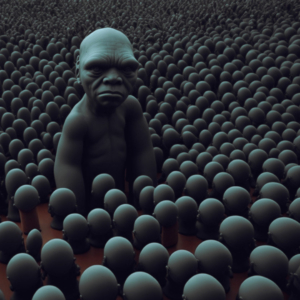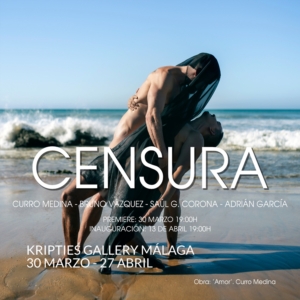LA PREOCUPANTE DERIVA DE LA CENSURA EN EL ARTE
Desde la reflexión sobre el valor de la igualdad y los derechos humanos, nacido en la democracia, siempre he considerado vital seguir reivindicando, ganando pero también recuperando derechos en nuestra sociedad.
A veces damos por hecho que el mundo avanza de forma lineal y que la inercia nos lleva a un lugar más próspero y amable. Y siendo así, puede resultar sorprendente que en pleno siglo XXI estemos viviendo un retroceso como el actual, en concreto en el ámbito de la cultura y el arte. Sin embargo, solo hay que hacer un rápido repaso a la Historia para evidenciar lo equivocados que estamos, y que los derechos y las libertades nunca están aseguradas.
Esta preocupación nos llevó en Kripties, a principios del presente año, a inaugurar la exposición ‘Censura’. A través de los discursos y obras potentes de excelentes artistas como Bruno Vázquez, Saúl Corona, Adrián García y Curro Medina, invitamos a reflexionar sobre están experimentando un movimiento de cancelación, término con el que se pretende suavizar una censura camuflada por la moderación.
Desafortunadamente, parece que nuestra evolución como sociedad ha olvidado educarnos en el respeto, pero también en la crítica, mostrándonos el papel fundamental que el arte y la cultura en la mejora de nuestra vida y la de nuestro entorno. No hay avance sin cuestionamiento.
LA GRAN RECESIÓN: NO ES CANCELACIÓN, ES CENSURA
En lugar de comprender que el arte abarca todos los aspectos de la vida, hoy nos escandalizamos aún con más fuerza por la desnudez, la religión y la sexualidad. Olvidamos que el arte nos lleva a explorar nuevos territorios, nos enfrenta a nuestros miedos y nos impulsa a superarnos. Limitar esta maravillosa herramienta de la imaginación, el pensamiento crítico y la creatividad, catalogándola como irreverente, ofensiva o inapropiada, no solo es desafortunado, sino que nos empobrece y nos conduce a la irrelevancia y la mediocridad.
Es fundamental recordar que el progreso de una sociedad se basa en el respeto a la libertad de expresión y la diversidad de perspectivas. Debemos defender la capacidad del arte para desafiar las normas establecidas, generar debates y evocar emociones. Solo a través de la apertura y el diálogo podemos seguir avanzando y construyendo un mundo mejor.
En esta lucha contra la censura en el arte, insto a todos a rechazar cualquier intento de silenciar las voces creativas y a promover un ambiente donde la diversidad sean celebradas. El arte tiene el poder de abrir mentes, inspirar cambios y construir un futuro más enriquecedor y equitativo para todos.
THE WORRYING TREND OF CENSORSHIP IN THE ARTS
Reflecting on the value of equality and human rights born of democracy, I have always felt that it is essential to continue to demand, win and regain rights in our society.
Sometimes we take it for granted that the world progresses in a linear way and that inertia leads us to a more prosperous and friendly place. If this is the case, it may seem surprising that in the 21st century we are experiencing such a regression, particularly in the field of culture and the arts. However, one only has to look at history to see how wrong we are and that rights and freedoms are never secure.
This concern led us at Kripties to inaugurate the ‘Censorship’ exhibition earlier this year. Through the powerful discourses and works of excellent artists such as Bruno Vázquez, Saúl Corona, Adrián García and Curro Medina, we invite you to reflect on the fact that we are experiencing a movement of cancellation, a term intended to soften a censorship camouflaged by moderation.
Unfortunately, it seems that our evolution as a society has forgotten to educate us in respect, but also in criticism, showing us the fundamental role that art and culture play in improving our lives and those of our environment. There is no progress without questioning.
THE GREAT RECESSION: IT’S NOT CANCELLATION, IT’S CENSORSHIP
Instead of understanding that art encompasses all aspects of life, we are now even more scandalised by nudity, religion and sexuality. We forget that art leads us to explore new territories, confronts us with our fears and pushes us to improve ourselves. To restrict this wonderful tool of imagination, critical thinking and creativity by labelling it irreverent, offensive or inappropriate is not only unfortunate, it impoverishes us and leads to irrelevance and mediocrity.
It is important to remember that the progress of a society is based on respect for freedom of expression and diversity of perspective. We must defend art’s ability to challenge established norms, to provoke debate and to evoke emotion. Only through openness and dialogue can we move forward and build a better world.
In this fight against censorship in the arts, I urge everyone to reject any attempt to silence creative voices and to foster an environment where diversity is celebrated. Art has the power to open minds, inspire change and build a more prosperous and just future for all.




